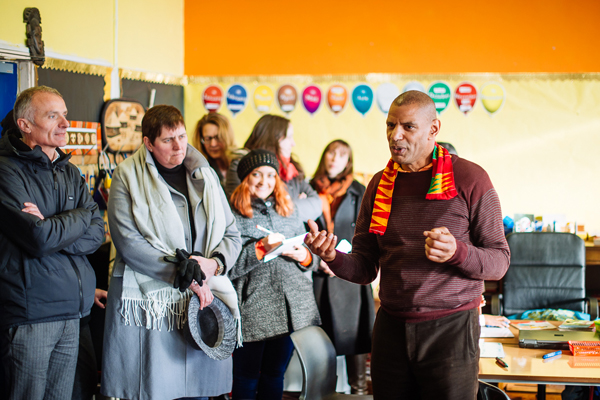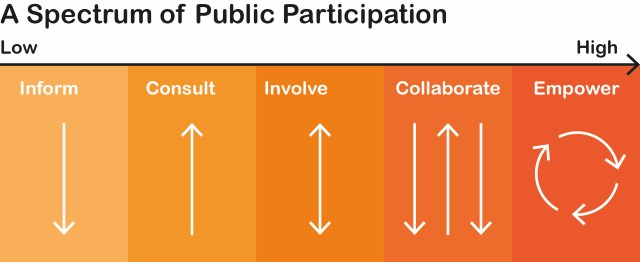Community businesses are particularly well placed to unlock creativity in our neighbourhoods. We’ve seen them do it after working with more than fifty community businesses over the last eighteen months through the Community Business Leaders Programme.

When it comes to complex social challenges, like tackling rising childhood obesity, figuring out how to provide healthcare to an ageing population, or even how to unite a divided country, we cannot rely on the state alone, nor on any individual organisation. These are problems that will only be solved when many heads are involved, combining insights and experiences to think and act innovatively.
Luckily, there are people in communities across the country are showing real determination and taking responsibility to address these issues in their local areas. And they are doing it with a spirit of collaboration not competition. They believe that anyone can have a good idea; they create an atmosphere in which everyone believes that their opinions are genuinely listened to and valued; and they find the resources and ability to act on those ideas. This might seem simple but very few of the institutions around us give this room for creativity; the search for efficiency has driven out flexibility from public services and traditional business does not always consider the wider social context.
Community businesses are different; they are built of and by a community to solve a local problem or meet a local need. This might be coming together to take over a service previously run by the local council, like a leisure centre or library, or it might be a new venture altogether like setting up a community farm or growing project. There are over 7000 community businesses in England and these organisations have particular qualities which make them better suited than private business or public sector organisations in enabling people to turn ideas in local action.
Working with more than fifty community businesses over the last eighteen months, we have identified a handful of common qualities which seem to be central to community businesses successful enabling people to put their ideas into practice.
- Sharing power: how we make decisions
- Sharing learning: how we learn from mistakes
- Building bridges: how communities can partner with other organisations
- Inspiring action: how one thing can lead to another
- Understanding place: local knowledge can generate new ideas that are well-rooted and more likely to succeed
How community businesses help communities to harness their creativity:
These are the five qualities that help community businesses support the communities in which they operate:
#1 Sharing power: how we make decisions
There are different ways in which we can be involved in decision making, from being merely informed that a decision has been made through to having a core role in shaping what that decision is.
In the RSA’s work on public participation we view these different forms of participation along a spectrum. The majority of the interactions we have with the organisations around us would be found at the ‘inform’ or ‘consultation’ end. If the local bus company doesn’t serve the route I want, there is little I can do to influence it beyond replying to a consultation. In our public services this style was entrenched in the New Public Management approach, which, in its search for efficiency, stifled creativity and left no room for people to shape the service they received. Consider the inflexibility of interacting with the Job Centre as depicted by Ken Loach in “I Daniel Blake”.

These examples highlight the lack of any real power being handed over to us citizens by the institutions and organisations that we interact with. This discourages creativity because there is little point in engaging if you feel that your input is neither genuinely wanted nor acted upon.
Community businesses, on the other hand, are committed to sharing power and encouraging varied and greater levels of participation. They achieve this in a variety of ways, from shareholder or member voting to regular consultations, and open door policies. These more participative approaches are built into the way the organisations run and are core to their ethos.
Take Burton Street Foundation in the Hillsborough area of Sheffield. One of the very first community asset transfers in 1998, the collection of buildings that make up Burton Street Foundation are today home to over fifty different businesses, community groups and charities, and over 2500 people visit the centre each week. The Foundation has a board of local Trustees and there are regular opportunities for user groups and for the wider community to share their ideas about the future of the centre, be it developing the overall strategy or improving support for particular groups, like pensioners. A large part of Burton Street’s work is supporting adults and young people with learning and physical disabilities. Each year they hold a two week long forum with these groups to gather feedback and generate ideas for improving or developing new services. These sessions directly shape future business plan of the Foundation.
Approaches like these enable people to move from being recipients or consumers of services to co-creators, having a real say in the way these services are designed and run. Burton Street demonstrates the different levels of engagement which community businesses can provide, allowing people to get involved to a greater or lesser extent as suits them: building their skills through volunteering, joining the trustee board or just getting out of the house and meeting people. This recognises that not everyone will have the time or interest to be involved in every decision, but knowing that everyone’s input is welcomed and acted upon sends an important signal.
This sharing of power reaches into the organisations themselves; a number of the businesses we’ve worked with are interested in non-hierarchical working structures. Oblong in Leeds, for example, is a community centre with a flat management structure which they believe empowers the staff by entrusting them with the flexibility they need to do their best work. Their approach to problem solving is an example of ‘new power’; peer-driven and with a collaborative approach to problem solving.
#2 Sharing learning: how we learn from mistakes
With this shared power comes the opportunity for learning what works and what doesn’t. This is important for sparking new ideas. We sometimes imagine that a creative solution comes in a flash of inspiration, when in reality it is the process of learning from repeated attempts that is crucial to nailing the desired outcome. Like any other skill, creativity needs to be practised, and the best way to do this is by being involved in trying things out, learning from how they went and trying again.
At community level this is about having places and organisations that let people have a go for themselves, supporting them where they need it but also allowing them to make mistakes and learn from them. Volunteers at Squash Nutrition in Liverpool, for example, develop their own small projects with guided support from the wider team, and Redcar Development Trust do something similar when they support young people to test out their enterprise ideas. Testing and developing ideas is core to the ‘fail fast’ approach of the entrepreneur and community businesses can provide a secure setting for people to do this.
#3 Building bridges: how communities can partner with other organisations
Community businesses have a strategic position: they can help the community identify and support local needs, and they are also in the position to work with other organisations to support larger actions, be that other community businesses, wider civil society, more traditional business or government.
The experience of delivering health and wellbeing programmes to communities in Leeds has led a number of organisations in the city to think about how they can work together and with other organisations to provide even more support. With the NHS’ resources under pressure these organisations have seen the potential for formalising the role that many community businesses and other civil society organisations play in healthcare provision. Bill Graham, Manager at New Wortley Community Association is advocating for this Community Health Service, seeing it as an opportunity for the sector to invest in sharing best practice and ensuring consistently high quality standards, and relieving pressure on overstretched GPs. This is an exciting proposition driven by communities who have experienced high quality local care and see that, given the right support as part of the NHS, this potential for this to be more consistently available.
#4 Inspiring action: how one thing can lead to another
For many communities, and individuals, there is still a big leap of imagination required between seeing a cherished institution like your local library or pub threatened to deciding to run it as a community venture. Those who take that leap are showing us that it can be done and offering inspiration to others to follow suit.
The Bevy is the only pub serving the 18,000 people who live Moulsecoomb, Bevendean and Bates housing estates in Brighton. It’s owned by about 750 shareholders and run by a committee, most of whom live on the estates and who campaigned to reopen the pub after it was closed by the council for anti-social activities. Today it is more than a pub, it provides a much needed community hub and is at the heart of local initiatives to improve health and wellbeing. Examples like this open us up to different ways of doing things, particularly when we can see them on our doorstep. The Bevy is spurring the locals on to think differently about other buildings and services in their area could be run, and the team are sharing their experience with groups from other parts of the county who want to do something similar.
#5 Understanding place: local knowledge can generate new ideas that are well-rooted and more likely to succeed
Community businesses’ commitment to a particular geographical place enables them to get under the skin of the specific opportunities which exist in their area. In Barking and Dagenham, Company Drinks have tapped into the local heritage of hop picking to create a drinks brand which teaches people about growing, manufacturing and enterprise, brings generations together, and helps people connect with local history.
This in depth knowledge of a local area may enable organisations able to respond to community needs in a faster and in a more flexible way than other organisations would be able to. Opportunities described as social moments, such as a community centre closing, offer the chance for something new to emerge and first hand community knowledge is key to making this work. Indeed, it is often an event of this kind which leads to the formation of a community business in the first place.
New Wortley Community Association in Leeds, which already runs a successful community centre, is embarking on a new project to build affordable housing on a site in the area. Because they are already established, know what the community want and are trusted, they are able to act on this opportunity to develop the site for the benefit the local residents.
From local change to large scale change
Community businesses are playing an important role in helping people take action in their local areas. Because they are small and locally focused the chain of communication is short; information can flow quickly to everyone involved, and this means that, in terms of learning from mistakes or innovating, the feedback loops can be effective. We have seen that these organisations have different ways of getting people involved in what they do. This participation is important because it widens the pool of potential ideas that can be tapped into and gives people the confidence to pursue their ideas instead of keeping them to themselves. Finally, being rooted in particular place is important because it means these organisations can draw on local knowledge and connections as a source of ideas and ways to turn them into action.
Conclusion
The examples we’ve seen demonstrate the positive outcomes that can be achieved when institutions enable people to have greater power, greater influence and make a greater contribution. Their achievements hint at the potential that these organisations have to help transform our communities and we must champion the work that they do.
What we’ve discussed so far would broadly fall under the banner of empowering communities, creating the right conditions for people to be able to take action. This is very important, and community businesses are helping to remove some of the stumbling blocks people otherwise encounter. But we mustn’t think this is sufficient to enable change at scale.
In our programme we have also seen the challenges that these organisations face when they interact with other organisations which do not have the same qualities. Community businesses are important but not sufficient to tackle the difficult challenges in communities. When it comes to enabling all of us to put our ideas into action and support the solving of wider problems, we need to address issues in the wider system too.
We need to look at the wider conditions, are they also conducive to enabling action? Because without a whole system which enables, reinforces and supports the work that community businesses are doing at a local level then that creativity is going to get stuck.
In the way that community businesses share power with local people so too do community businesses need power to be shared with them. This means that local councils, public bodies like the NHS and larger charities need to involve community businesses in their decision making in a way that goes beyond simple consultations.
It also means recognising the potential that these small scale, flexible organisations have to test out innovative ideas which the larger organisations would struggle to implement, and entrusting them with the room and resources to try them out and learn from them.
Alongside supporting and enabling the work of community businesses and other similar organisations, we should also be looking at other ways of opening up routes for citizen participation.
The RSA Citizen’s Economic Council has made the case for involving citizens in national conversations about economic policy, and authorities in the UK and abroad are exploring participatory approaches, like participatory budgeting to give power more directly to citizens. Community businesses can provide valuable opportunities to include a very diverse range of citizens in shaping their place.Complex social challenges cannot be solved by individual organisations or the state acting alone, instead we need the combined knowledge and action of everyone: from Whitehall to village hall, we need to enable more people to turn their ideas into action. When something doesn’t work, some people think the fault lies with them, others think it lies with the idea, or the way it was implemented - these are the ones who will reflect, learn and try again. Tackling knotty challenges requires this kind of creative thinking and persistence across society.
Community businesses are doing this at a local level but other organisations must take inspiration and share power if citizens are to fulfil their potential to take actions that positively impact on society. A participant in a recent RSA workshop in Oldham described it as a ladder: “If I want to change big things up there then I can’t go from here to there just like that, there need to be steps to get there. When those steps are missing, it doesn’t work”. Community businesses offer those first steps but all of us must recognise that the only way to solve societal challenges is by getting involved ourselves and, crucially, we all have a role in creating the steps that enable others to do the same.
Josie Warden is a Researcher in the RSA's Economy, Enterprise and Manufacturing team.

Be the first to write a comment
Comments
Please login to post a comment or reply
Don't have an account? Click here to register.